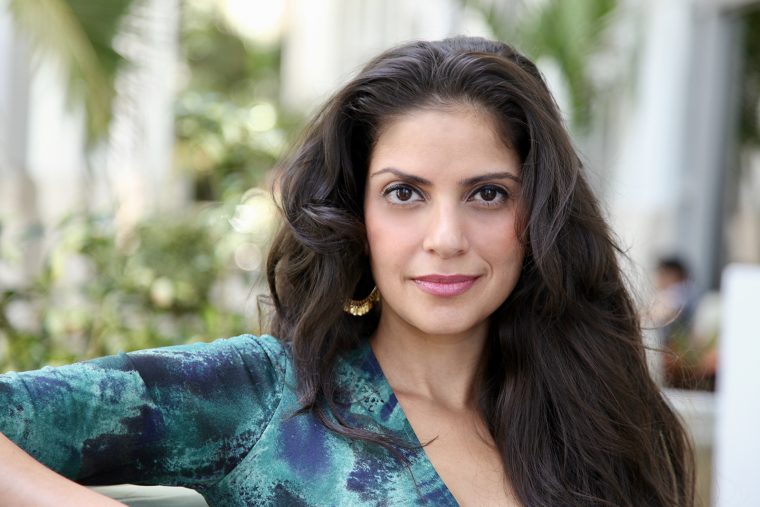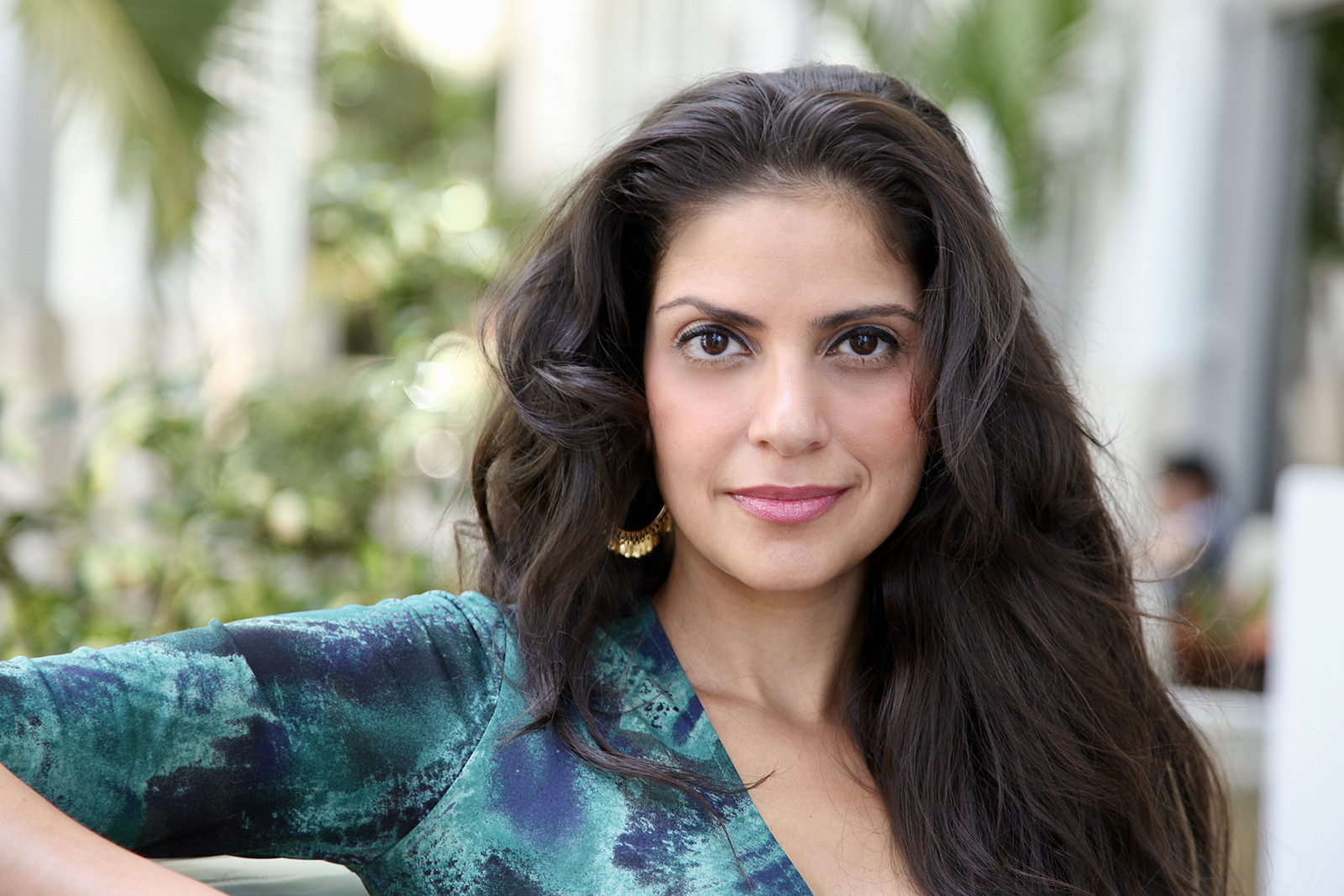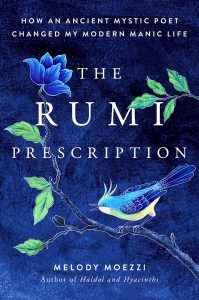Moezzi ’01 Shares Reflections, Advice on Applying Rumi’s Wisdom to Modern Life


The timing of the release of The Rumi Prescription: How an Ancient Mystic Poet Changed My Modern Manic Life (Penguin Random House, 2020) was far from ideal. Officially out March 3, the new book by Melody Moezzi ’01 was barely in readers’ hands before social distancing restrictions were imposed due to the coronavirus pandemic. Moezzi was able to participate in a handful of events near her home in Wilmington, N.C. . . . and then the remainder were canceled or rescheduled in virtual form.
 However, The Rumi Prescription is the sort of book that people with extra free time on their hands—and the inclination to obtain meaning from difficult experiences—might value. Moezzi’s third book, The Rumi Prescription details how she came to interpret and apply the lessons of the 13th-century mystic poet Rumi to her modern-day world, a process that was ultimately life-changing.
However, The Rumi Prescription is the sort of book that people with extra free time on their hands—and the inclination to obtain meaning from difficult experiences—might value. Moezzi’s third book, The Rumi Prescription details how she came to interpret and apply the lessons of the 13th-century mystic poet Rumi to her modern-day world, a process that was ultimately life-changing.
An Iranian-American Muslim author, attorney, activist, and visiting professor of creative nonfiction at the University of North Carolina Wilmington, Moezzi has also written about mental health in her 2014 memoir Haldol and Hyacinths: A Bipolar Life. On May 18, she will participate in a live Zoom conversation about The Rumi Prescription with fellow mental wellness activist and illustrator Ellen Forney ’89, as part of a series offered by Literati bookstore in Ann Arbor, Michigan. Click here to join the event on May 18.
Moezzi recently answered questions about The Rumi Prescription, how Rumi’s words can apply to today’s world, and her advice for taking care of your mental health during a pandemic.
First of all, how’s The Rumi Prescription doing? What a time to launch a new book.
Melody Moezzi: It’s not the best time to be releasing a book, but it turns out that the topic of this book is actually something that is helpful for people right now, so I’m glad for that. At least people seem to be finding comfort in it.
I even wrote a bit about the power of viruses in the book. I’ve always sort of admired them, how these tiny things can invade and replicate—I have a master’s in public health and both my parents are doctors. I’ve always thought it was a miracle that this [sort of pandemic] hadn’t happened in my lifetime at least.
In the book itself, [the discussion of viruses is] more about how the way that you learn to find a vaccine is to study the virus itself. Rumi suggests that the cure for whatever pain or ailment you have begins with respecting and studying that pain. He says (in my translation): For a viable cure, pain is the key. Your injury invites the remedy.
What can Rumi offer us today, particularly in the midst of a pandemic?
MM: He has a lot of poems that I’ve found a great deal of comfort in during this time. Here’s one: Why seek pilgrimage at some distant shore, when the Beloved is right next door? Initially when my book tour was canceled and all this happened, it was a nice reminder that you don’t need to go far to find hope, to find healing. It’s right where you are.
What other words of Rumi’s do you think can apply lately?
MM: These are a few others I’m finding comfort in right now: [All translations are Moezzi’s.]
- You went out in search of gold far and wide, but all along you were gold on the inside.
- Every storm the Beloved unfurls permits the sea to scatter pearls.
- Become the sky and the clouds that create the rain, not the gutter that carries it to the drain.
- Welcome every guest, no matter how grotesque.
Be as hospitable to calamity as to ecstasy, to anxiety as to tranquility.
Today’s misery sweeps your home clean, making way for tomorrow’s felicity.
You’ve written about mental health and particularly your own mental health before. What risks does this pandemic—in which many of us are being told to stay at home and away from others—pose to mental health?
MM: It poses a lot of risks. For instance, I deal with depression. My primary symptom is isolation. I isolate myself from the world, and one of the best things I can do to cure myself is to get out in the world, physically. It’s funny to have these symptoms imposed, and then hope that they don’t lead to the condition.
I’ve come to the conclusion that every day is different. I’m accepting that some days will be bad. But I have to remind myself that the next day can always be better. One of the biggest delusions of depression is that you’ve always felt this way and that you will always feel this way. It robs you of the insight that things can and will be different, better.
I know of so many people [with mental health conditions] who are far more successful than I am, in every field, who have written me personally because they’ve read my books and have said, “Thank you for being public about this, in a way that I never could.” It’s important to remember that people living with mental health conditions are highly capable, and in some cases extra capable. Being able to see that kind of triumph in the face of adversity, both in my own life and in the lives of the many wildly successful people who write to me to share their stories, has been a huge source of pride and inspiration for me. I have no doubt that it has helped keep me well.
How can anybody protect their mental health right now?
MM: One of the top things I would suggest is to maintain a routine—not necessarily the same routine that you had before. But create a routine for yourself, keep it up, and don’t think too far ahead into future, because the answer to pretty much everything right now is “we just don’t know.”
What Rumi specifically says about this is: Forget your plans and embrace uncertainty. Only then will you find stability. If you think about it, so much of life is uncertain and if you find a way to embrace that instead of constantly fighting it, you’ve found a viable path to peace.
You grew up hearing about Rumi from your dad, who was a huge fan of Rumi’s poetry, but you didn’t get to know Rumi well until much later in life.
MM: I grew up with Rumi in the house; he was everywhere. Every lesson my father has ever taught me was accompanied by a couplet or a quatrain. But I never embraced Rumi on my own until after I had a manic episode that overlapped with a mystical experience [and was diagnosed with bipolar disorder]. That mystical experience included this feeling of being deeply connected to every other living thing on the planet, down to the cellular level, to the point where I recognized that I couldn’t harm any other living thing without also harming myself, because we were connected.
After that experience, I’ve never been able to question, even intellectually, the existence of the Beloved in the same way. Certain things strike me on a daily basis, like cutting open a head of cabbage with all those intricate curves and twists inside that seem to reflect the grooves that form our own brains. I know these are ordinary patterns, but they also seem extraordinary to me. This sense of awe in the ordinary is what that mystical experience woke up within me. It’s not always at the forefront of my awareness, but I know it’s always true. I see these sorts of reflections and connections everywhere now.
Do you think Rumi made those same sorts of connections?
MM: Yes. His poetry isn’t meant to be read while sitting. Rather, it’s meant to be sung while spinning. He was the first of the so-called whirling dervishes, and honestly, if he were alive today, I suspect that he, too, may have been hospitalized. Our planet has a long history of confusing wisdom for madness and vice versa.
It’s interesting. When I start to go manic, I often start to rhyme. Rumi wrote in rhyming couplets; my translations [of his words in The Rumi Prescription] are all rhyming as well, because I found it important to maintain the musicality of his verse. I actually started rhyming in my own prose without trying for a few pages in the middle of the book, and writing those few pages was so strange for me. I actually feared that I might be going manic because of how naturally rhyming comes to me when I’ve been manic or hypomanic in the past. But thankfully, I was fine. I stopped writing for the day after that, centered myself, and was able to go to sleep. I think what protected me from going manic there (apart from sleeping and the fact that I take meds for my condition) was being so ensconced in Rumi’s poetry at the time, poetry that is not only deeply spiritual, but that is also part of my own culture and ancestry.
But again, just for the record, I do take meds as well. I’m not in any way suggesting that anyone with bipolar or any other serious mental health condition can be cured by poetry alone. I’m just saying that it can be intensely healing, both for people like me with serious mental health conditions and for others with no psychiatric diagnosis to speak of but who live in a world that seems to be getting crazier by the minute.
This book isn’t for people with mental health conditions, it’s for people with emotions, which is just another way of saying everyone.
As a person of Persian descent, do you feel like Rumi’s words resonate on a deeper level with you?
MM: I think so. There’s something powerful about connecting with the culture, history, and rituals of your ancestors, and for me, as an Iranian-American Muslimah, this was certainly the case. I want my readers to find comfort in Rumi’s poetry, and I’m confident that they will, but I also want them to find comfort and healing in their own unique cultures and histories.
Of course, being who I am, I also want people who aren’t Persian and don’t speak Farsi to fully understand that this poet was a Muslim, an Iranian, and a refugee. Why? Because as an American, I’m tired of my country banning people who meet any or all of these criteria. So in addition to being a book that I hope will help my readers come closer to the Beloved within themselves and within all of us, this is also a book that I hope will remind my fellow Americans that this poet whose verses they seem to love so much is also a Middle Eastern, Muslim refugee. . . . My hope is that this book will help . . . encourage readers to start doing the work of making this world and this country a place that welcomes instead of bans Muslim and Middle Easterners like Rumi and me.

